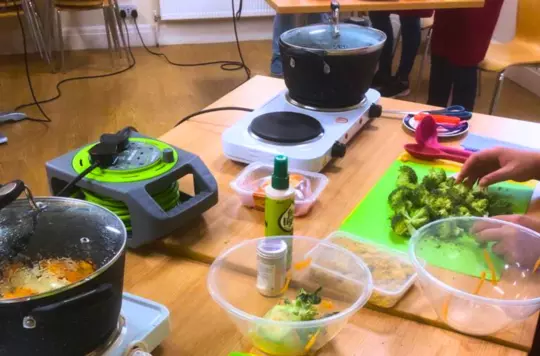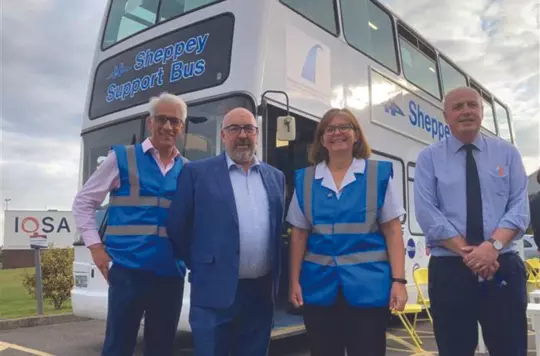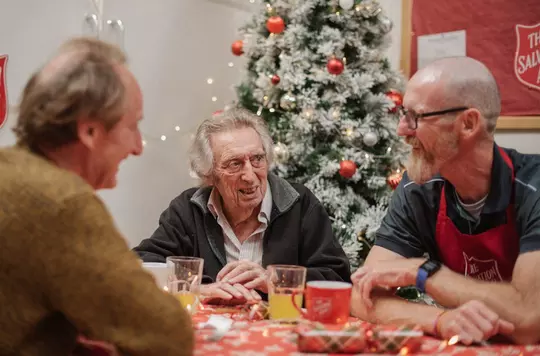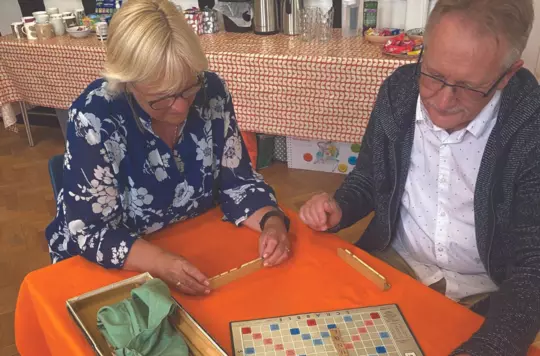18 November 2023
Social supermarkets: Shopping with dignity
George Tanton

George Tanton checks out the growth of social supermarkets.
As the cost of living crisis continues, food banks remain an integral part of The Salvation Army’s commitment to helping people in need and alleviating socio-economic hardship.
‘Our food bank is a place of hope and genuine love for the community we serve,’ testifies Goldthorpe corps leader Territorial Envoy Alison Sykes.
In recent years, a number of corps have pioneered another way to meet people’s needs: through social supermarkets. The latest to launch is Stuff on the Bus in Canvey Island. This mobile shop operates out of a refurbished double-decker bus, with customers able to purchase items at greatly reduced prices.
Pioneer Community Leader Holly Alberici says: ‘We are hoping to fill in the gap between food bank and supermarket. People can jump on board and get what they need. I’m looking forward to the community using the bus in a welcoming and non-judgemental environment.’
As a growing initiative across the territory, social supermarkets – also referred to as ‘community pantries’, ‘food clubs’ and ‘community stores’ – act as co-operatives. Service users contribute a small payment in return for food and hygiene goods. This provides them with what they need, as well as dignity, independence and a sense of normality in uncertain times.
It also means that the shelves can be sustainably replenished, amid a cost of living crisis that can also potentially impact food banks.
‘We have seen a decrease in goods at our drop-off points, largely because those donating are also struggling to balance their budget,’ observes Captain Debbie Eaton (Preston).
At Stockton, the Bread and Butter Thing – funded by Stockton-on-Tees borough council and Thirteen Housing – offers three bags of fruit and veg, chilled food and cupboard staples for £8.50. It runs alongside the twice-weekly corps food bank.
Captain Lee Raggett (Stratford) oversees the corps community store in Newham, the local authority with the highest destitution rates in the UK.
‘Each time someone shops they make a £5 contribution for 30 items of food,’ Lee explains. ‘In reality, one carrier bag of fruit and vegetables counts as one item. We estimate that a full shop at our store can save a family between £50 and £80 per week.’
Choice is central to the service, offering the freedom of preference for those struggling to keep their heads above water.
‘We try to give people as much choice as possible,’ affirms Lee, ‘while also having limits on the amount of each item someone can take. This helps us to ensure that there is enough food to share between everyone fairly. This is based on the biblical concept of gleaning from Leviticus 19:9 and 10.’
Simulating an ordinary shopping experience reduces any stigma associated with food provision. As well as getting a box of weekly supplies, service users have the dignity of using their own money to feed their families.
Captain Naomi Kelly (Middlesbrough Citadel) says: ‘There is still a need to destigmatise food banks. We specifically market ours as a shop where people pay a little towards what they get. I think this releases any potential shame. It’s not a free handout.’
Territorial Director of Community Services Tony Daniels links the reasoning behind the social supermarket model to Matthew 25:35 and 36.
‘We are supporting those on the margins of society,’ he explains. ‘Those who don’t have a voice and those not at the decision-making table. No matter the social demographic, everyone should be supported to have self-determination. By simulating a normal shopping environment, we want to restore people’s self-esteem and give them choices and dignity over the very basics in life.’
‘We shouldn’t assume that just because someone is struggling, they automatically like baked beans!’ observes Naomi.
Simon Fenn, community manager at Sheringham, runs the corps food club, which supports 134 households – the equivalent of 315 individuals. Service users pay an annual membership of £5, which enables them to purchase a range of food items at substantially reduced prices. Free fresh fruit and veg are also offered to every household.
‘We offer them a shopping bag when they enter,’ explains Simon. ‘They get to choose what they want rather than us choosing for them. They are empowered.’
Simon strongly believes that social supermarkets can provide a route towards self-sufficiency.
‘We are trying not to create dependency, but move them away from emergency provision,’ he explains. ‘It’s not a handout, but a hand up.’
Social supermarkets are also places where the Army provides holistic support. As community hubs, they signpost people towards additional services, such as employment or housing advice.
In Canvey Island, the supermarket is on the bottom deck of the bus while the top deck has facilities including a mobile banking unit, Employment Plus and a wellbeing coach.
‘We find that food poverty is usually masking other issues and we really want to gently peel back the layers to support each individual in a way that helps them to take control,’ says Lee.
‘In offering a space with dignity and choice and additional support, we are seeing people asking questions about faith and lives being transformed. One lady was living in fear of bailiffs and was so terrified that she couldn’t leave the house. She is now an amazing volunteer and is always asking for more Jesus stories!’
‘It’s about building relationships,’ states Simon. ‘We get to know a person’s circumstances and individual needs. One young mum comes to us because she feels welcomed and some of the older volunteers provide her with practical parenting advice.’
‘People can feel so much shame in food poverty,’ Lee adds. ‘We do all that we can to take that away.’
Written by

George Tanton
Editorial Assistant
Discover more

Simon Hope finds out how corps are cooking up community connections through the Victory Programme.

Major Lynne Clifton tells Melita Day-Lewis about a new mobile supermarket on the Isle of Sheppey.

As we face a difficult winter, Tony Daniels suggests a collaborative community response.

George Tanton finds out how Harwich Wellbeing Lounge is caring for its community.


